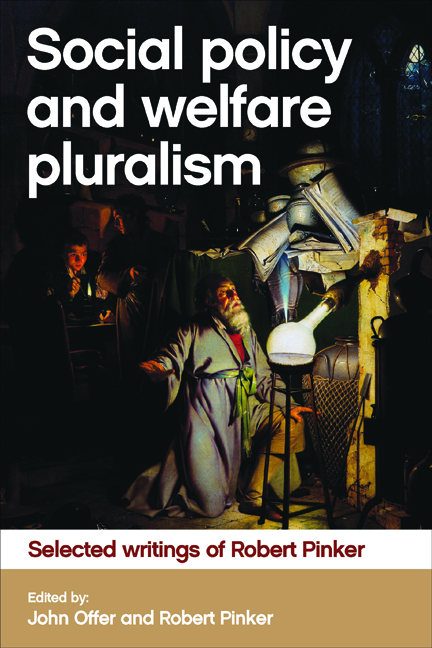Book contents
- Frontmatter
- Contents
- Acknowledgement
- Preface
- General introduction: Robert Pinker on rethinking approaches to welfare
- Introduction to Part One On social policy studies
- one The ends and means of social policy: a personal and generational perspective
- two Social theory and social policy: a challenging relationship
- three Stigma and social welfare
- four The welfare state: a comparative perspective
- five Richard Titmuss and the making of British social policy studies after the Second World War: a reappraisal
- Introduction to Part Two On social care, communities and the conditions for well-being
- six Report of the Working Party on the Role and Tasks of Social Workers: an alternative view
- seven The quest for community: from the Settlement Movement to the Griffiths Report: an historical perspective
- eight Citizenship, civil war and welfare: the making of modern Ireland
- Introduction to Part Three On welfare pluralism
- nine Golden Ages and welfare alchemists
- ten From gift relationships to quasi-markets: an odyssey along the policy paths of altruism and egoism
- eleven The experience of citizenship: a generational perspective
- twelve The right to welfare
- thirteen The prospects for social policy in the UK after the 2015 General Election
- Afterword On the post-Brexit prospects for social policy in the UK
- References
- Index
ten - From gift relationships to quasi-markets: an odyssey along the policy paths of altruism and egoism
Published online by Cambridge University Press: 08 April 2022
- Frontmatter
- Contents
- Acknowledgement
- Preface
- General introduction: Robert Pinker on rethinking approaches to welfare
- Introduction to Part One On social policy studies
- one The ends and means of social policy: a personal and generational perspective
- two Social theory and social policy: a challenging relationship
- three Stigma and social welfare
- four The welfare state: a comparative perspective
- five Richard Titmuss and the making of British social policy studies after the Second World War: a reappraisal
- Introduction to Part Two On social care, communities and the conditions for well-being
- six Report of the Working Party on the Role and Tasks of Social Workers: an alternative view
- seven The quest for community: from the Settlement Movement to the Griffiths Report: an historical perspective
- eight Citizenship, civil war and welfare: the making of modern Ireland
- Introduction to Part Three On welfare pluralism
- nine Golden Ages and welfare alchemists
- ten From gift relationships to quasi-markets: an odyssey along the policy paths of altruism and egoism
- eleven The experience of citizenship: a generational perspective
- twelve The right to welfare
- thirteen The prospects for social policy in the UK after the 2015 General Election
- Afterword On the post-Brexit prospects for social policy in the UK
- References
- Index
Summary
Introduction
The first issue of Social Policy & Administration appeared in 1967 under the title Social and Economic Administration – the same year in which the Social Administration Association was established. Richard Titmuss, in company with other leading social policy scholars, was a prime mover in this latter initiative. In the following year, Michael Cooper and A.J. Culyer published their monograph on The Price of Blood. Cooper was the first editor of this journal and A.J. Culyer was one of his two assistant editors. In their monograph they reviewed the arguments for and against paying blood donors and developing a role for competitive markets in the sale and purchase of blood products.
They concluded that there was a positive case to be made and that it should be tested further, by setting up an experimental market-based scheme for a trial period. Their monograph was edited by Arthur Seldon and it appeared under the imprint of the Institute of Economic Affairs. The Institute, Arthur Seldon (who was one of its directors) and the monograph were all anathema to Richard Titmuss.
The Institute had been established in 1955 as a policy think tank, specializing in the study of markets and pricing systems. Reappraising the effectiveness of the postwar British welfare state, and the potential role of competitive markets in the provision of social services were both subjects that stood high on the Institute's research agenda.
The Institute was not a conventional ‘right wing’ think tank. It was as critical of the social policies of the Conservative Party as it was of Harold Wilson's Labour government, which had taken office in 1964 after thirteen years of Conservative rule. Throughout the 1950s and early 1960s the Conservatives had done nothing to challenge the collectivist, universalist and redistributive principles on which the postwar British welfare state was based and to which Titmuss was so passionately committed.
In this respect, it is worth noting that, from time to time, Titmuss had served as a policy consultant to Conservative governments, notably with regard to the research he undertook with Brian Abel-Smith into the cost of the National Health Service (Abel-Smith and Titmuss, 1956).
- Type
- Chapter
- Information
- Social Policy and Welfare PluralismSelected Writings of Robert Pinker, pp. 209 - 224Publisher: Bristol University PressPrint publication year: 2017

